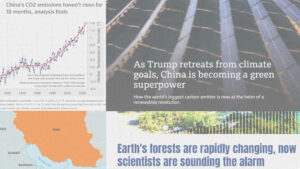Earlier this week there was a livestream debate highlighting the key points of the Green Growth and DeGrowth perspectives – this week’s Frankly adds a third perspective to the ‘growth critical’ conversation – that modern society has a metabolism and momentum and will grow – in non-green ways – until we can’t. This is a critical third category that should be included in these discussions, despite its ‘tougher sell’.
In French, we have a motto that says that a simple drawing is often better than a long explanation. Jean-Marc Jancovici Carbone 4 President
That’s very understandable because with left atmosphere thinking, one of the problems is that you see everything as a series of problems that must have solutions. Iain McGilchrist Neuroscientist and Philosopher
We can’t have hundreds and hundreds of real relationships that are healthy because that requires time and effort and full attention and awareness of being in real relationship and conversation with the other human. Nate Hagens Director of ISEOF
This is the crux of the whole problem. Individual parts of nature are more valuable than the biocomplexity of nature. Thomas Crowther Founder Restor
Show Notes & Links to Learn More
Download transcript01:11 – Degrowth/Green Growth Debate
03:45 – GDP is a poor measure for human prosperity
04:06 – Environmental problems wane in priority when the economy is poor
04:48 – Income is the single largest variable the correlates with emissions
06:12 – No gains in efficiency or technology has reduced energy consumption
06:25 – At 2.5% growth, we will grow 10x in a century, 100x in 2 centuries, and 1000x in 3 centuries
07:40 – We are doubling debt every 8.5 years, and doubling GDP every 25 years
09:35 – Climate is just one piece of a multivariate issue
11:07 – The Global North depends on the resources of the Global South
11:25 – There are over 4 million children in the UK living in poverty
12:15 – The price of lithium is up 900% since its scaling
13:18 – Adding renewables is contributing to emissions currently, not reducing them
14:21 – Germany upping coal imports and moving to wood
15:10 – The 1% spend [correction: 17%] of their income, while the bottom 40% spend 105%
17:04 – Klieber’s law and correlation with global energy use/economy
18:42 – Herman Daly Steady State
18:48 – Post-growth movement







